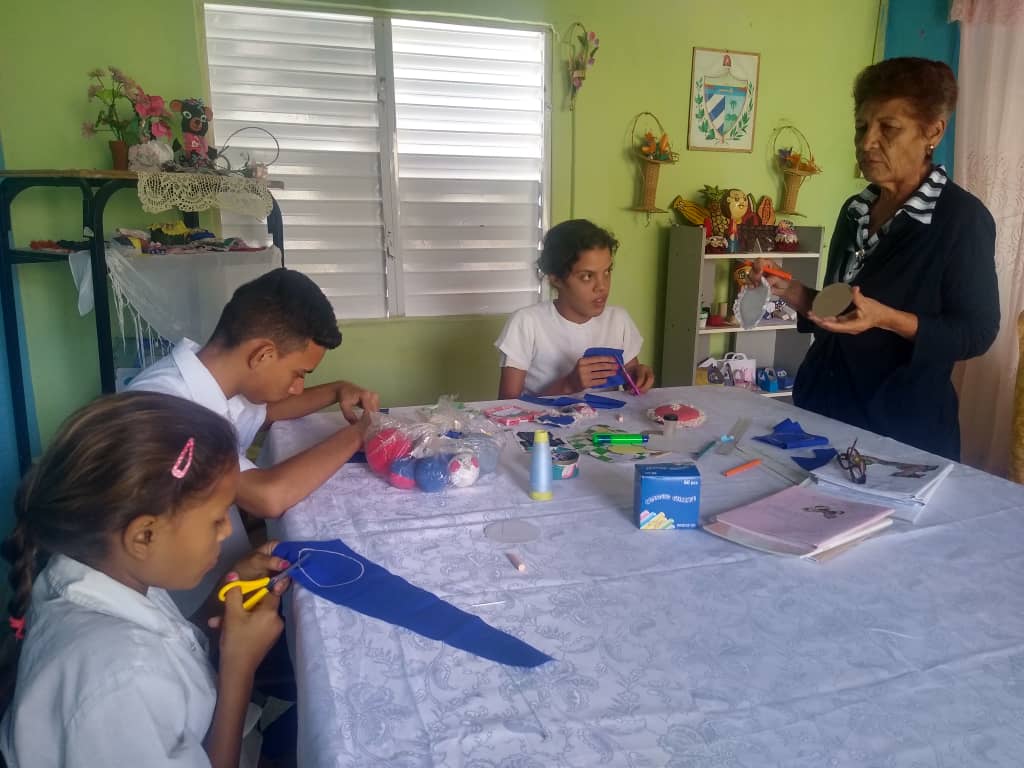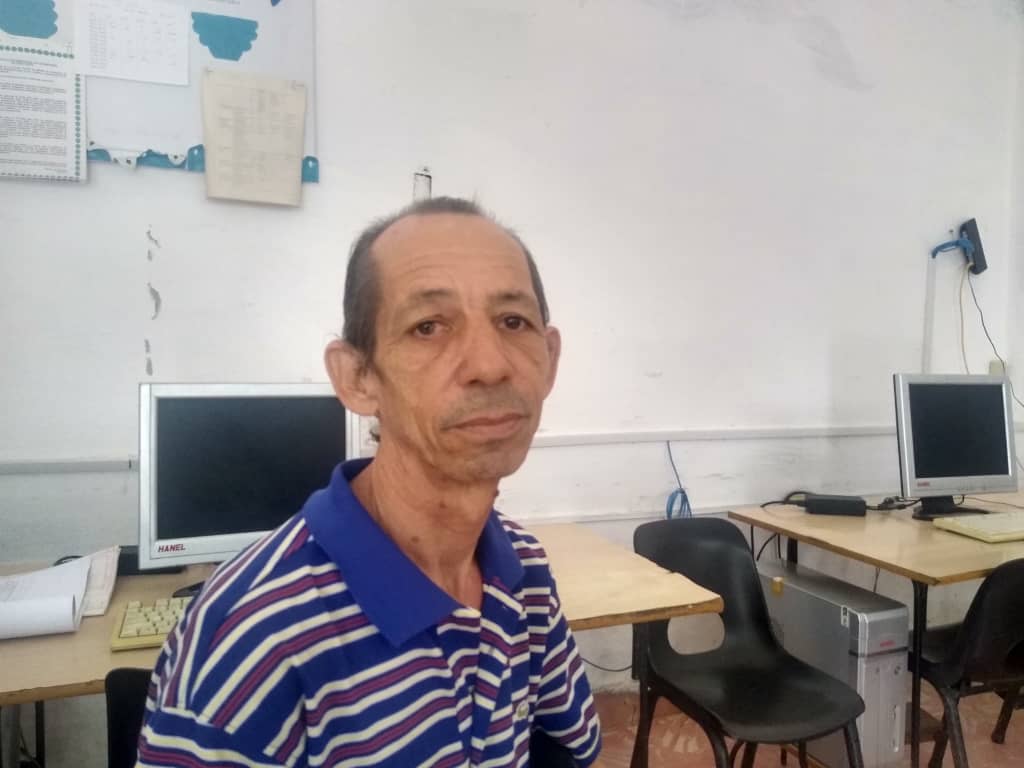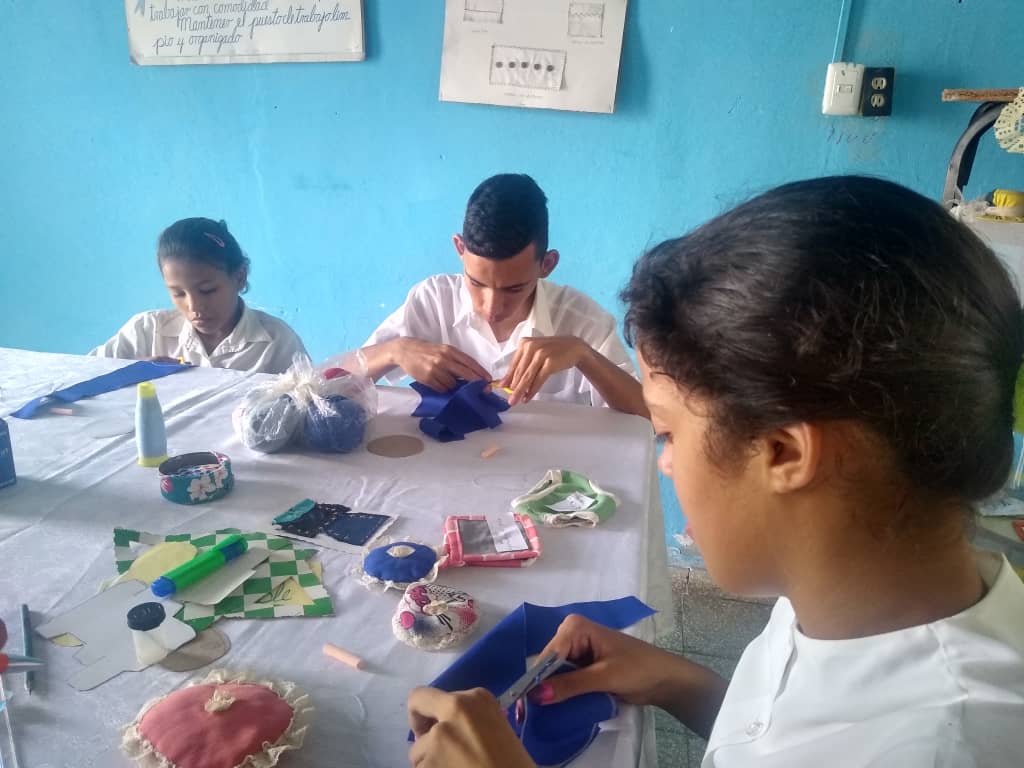
As Yaisimí Charles Torres speaks, she does not hide her shyness, but the impression of the moment does not stop her: "I have learned to sew, to stitch... and what I like most is the dressmaking workshop". She then goes into a short list of what she has achieved: dolls' dresses, doll's handles, balls, balls.
Very close to her, José Gabriel Rodríguez Diéguez and Ángela Keyla Lazo Castellanos also do their own thing in the world of handicrafts and they tell 26 with candor and tenderness. José says that he comes out afloat if a button comes off his shirt, and he has learned a bit about carpentry. Meanwhile, his classmate Ángela is training in hairdressing; they are her favorites, says the student at the Luis Augusto Turcios Lima Special Education School in the municipality of Las Tunas.
A LESSON IN LOVE
 "The 35 years of work in this school have meant many lessons for life," says Rafael Enrique Claro Machado, director of this school, with a joyful expression, in which, with sure steps, they support the growth of childhood and adolescence as special in its characteristics as is the collective of 73 teachers and 18 service workers.
"The 35 years of work in this school have meant many lessons for life," says Rafael Enrique Claro Machado, director of this school, with a joyful expression, in which, with sure steps, they support the growth of childhood and adolescence as special in its characteristics as is the collective of 73 teachers and 18 service workers.
"It is a source of pride to belong to this educational level and to develop such a sublime profession. We work with great responsibility, dedication, and love for our children; we also use flexible methods so that the teaching and learning process is successful and the pupils reach each level and the desired quality of life, achieving an active socio-occupational inclusion", explains the pedagogue.
In his words, he explains that "running a school of this kind is a challenge, especially at present, when the blockade has hit us so hard and also affects this system, but whenever the management is done with dedication and listening to the needs of the teachers and taking into account the families and the pupils, the task is more fruitful and better results are obtained.
"We have to look at the individuality of each diagnosis and the diversity is great; this diversity fills us with love and we work for an educational and social insertion, to acquire skills with a view to daily relationships and in the communicative sphere.
"This year we have 16 students in the trade school and we have seen that they are doing very well and this fills us with satisfaction."
Similar stories can be found in 14 other specialized schools in the province, where students with sensory impairments (hearing and visual), intellectual disabilities, and physical and motor disabilities, among others, are attended.
This training in Cuba emerged in January 1962, after the beginning of the revolutionary process of 1959, when there were only eight institutions in the country dedicated to this modality, then responsible for the care of only 134 students.
From that time to the present, this system has been consolidated with particularities that, at the same time, constitute strengths; such is the case of the so-called hospital classrooms for those who, due to long admission processes, are unable to go to school, or the internal centers that allow for the attention of residents in rural and difficult to reach areas, as well as the recognized itinerant teachers who, loaded with knowledge and affection, go to homes.
EDUCATING FOR LIFE

On the island, this type of teaching is an expression of society, and of the aspiration that there should always be, in all areas, a marked coherence between educational and social theory and practice. At the same time, each center is conceived as a transit school, to enhance the development of learners and put them in a better position to integrate into regular contexts.
"The teachers are prepared methodologically and based on the diagnosis of the students, their needs and potential", explains Evangelina Eloísa Contreras Collazo, deputy director of Labor and Intensive Training at the "Luis Augusto Turcios Lima". In her words, she emphasizes the work through the subject of Labor Education, up to the sixth grade and after the conclusion of this stage.
"They develop various skills such as cutting, tearing, measuring, tracing, drilling, and joining..., among others that, after completing this period from first to sixth grade, are reinforced in the multipurpose areas. On the other hand, in the pre-labor period, they receive workshops in textile manufacturing, domestic education, handicrafts, carpentry, beauty, bicycle, and shoe repair, and masonry; in addition, there is a cycle of work preparation in which the students go on to community workshops and family life."
MirthaFernández Segura knows this patient's work very well. Seventeen years in Special Education endorse the performance of someone who makes perseverance a daily tool to help her students progress. "We aim to prepare them for life in the community and to make them aware of the usefulness and characteristics of each action. We held a competition, and the children demonstrated what they had learned in the activities that are useful to them in their daily lives.
"It's a joy to see them develop, they do learn and they do it with love and understanding; in this teaching, we have to look for the inclination and tastes of each pupil and encourage that side. It makes me very happy to see them achieve goals and victories," declares the Primary Education graduate who has seen herself challenged with the noble principle of helping children to grow.
Commitment, knowledge and method, love, pedagogy, sensitivity... many are the keys to this teaching collective that trusts in the possibilities of Yaisimí, José Gabriel, and Ángela Keyla. In gratitude, they rise above difficulties and stigmas; they show that they can, from their respective heights, but they can.





